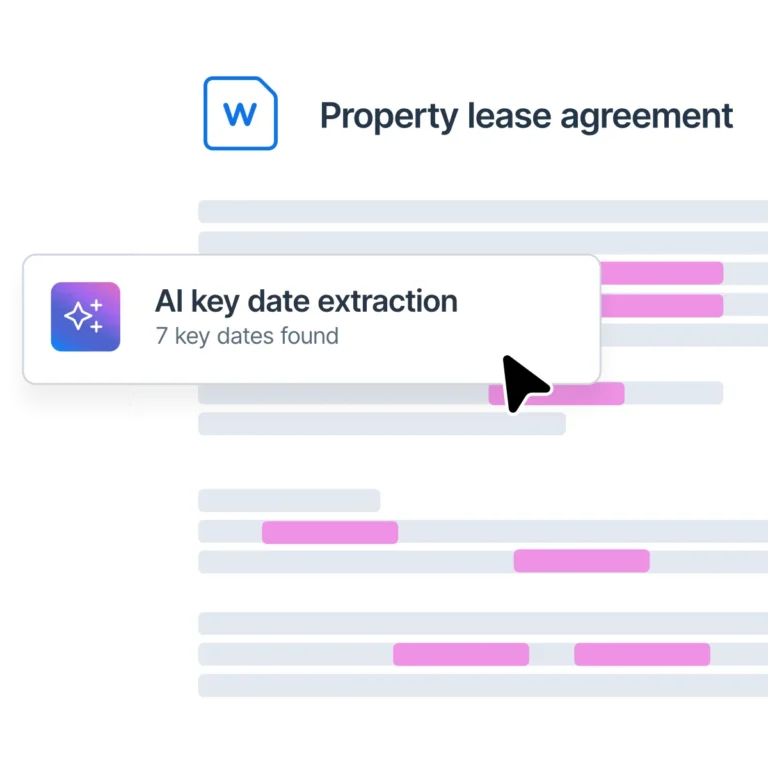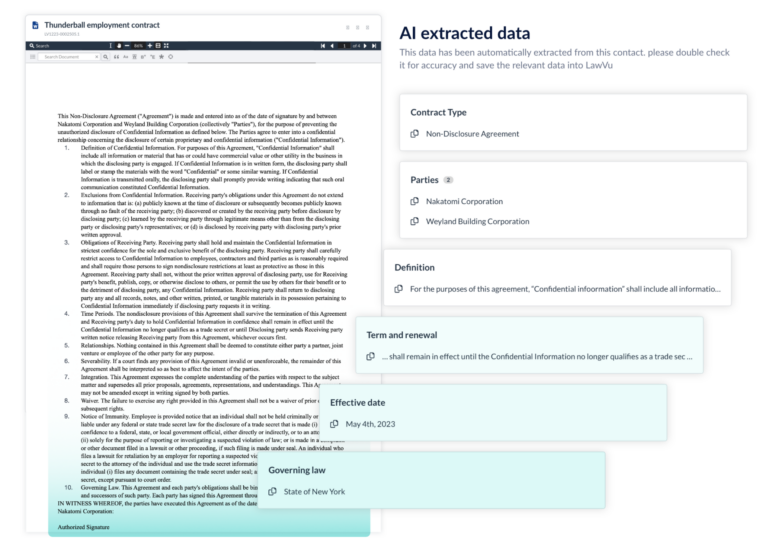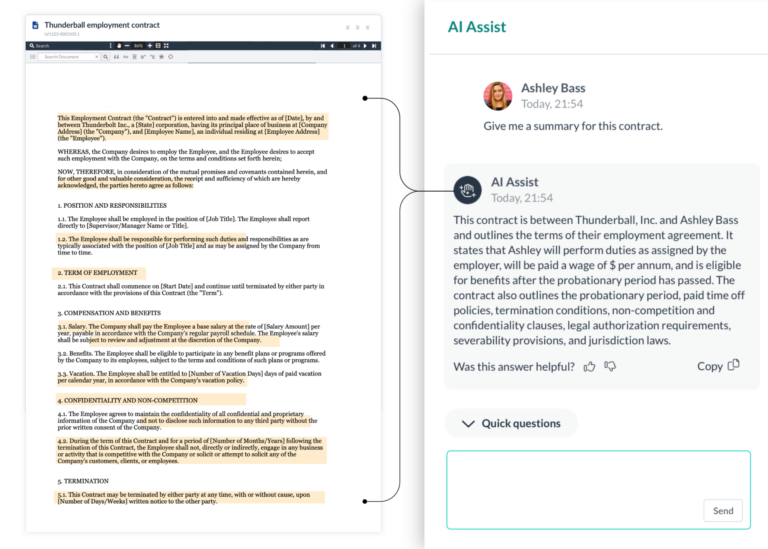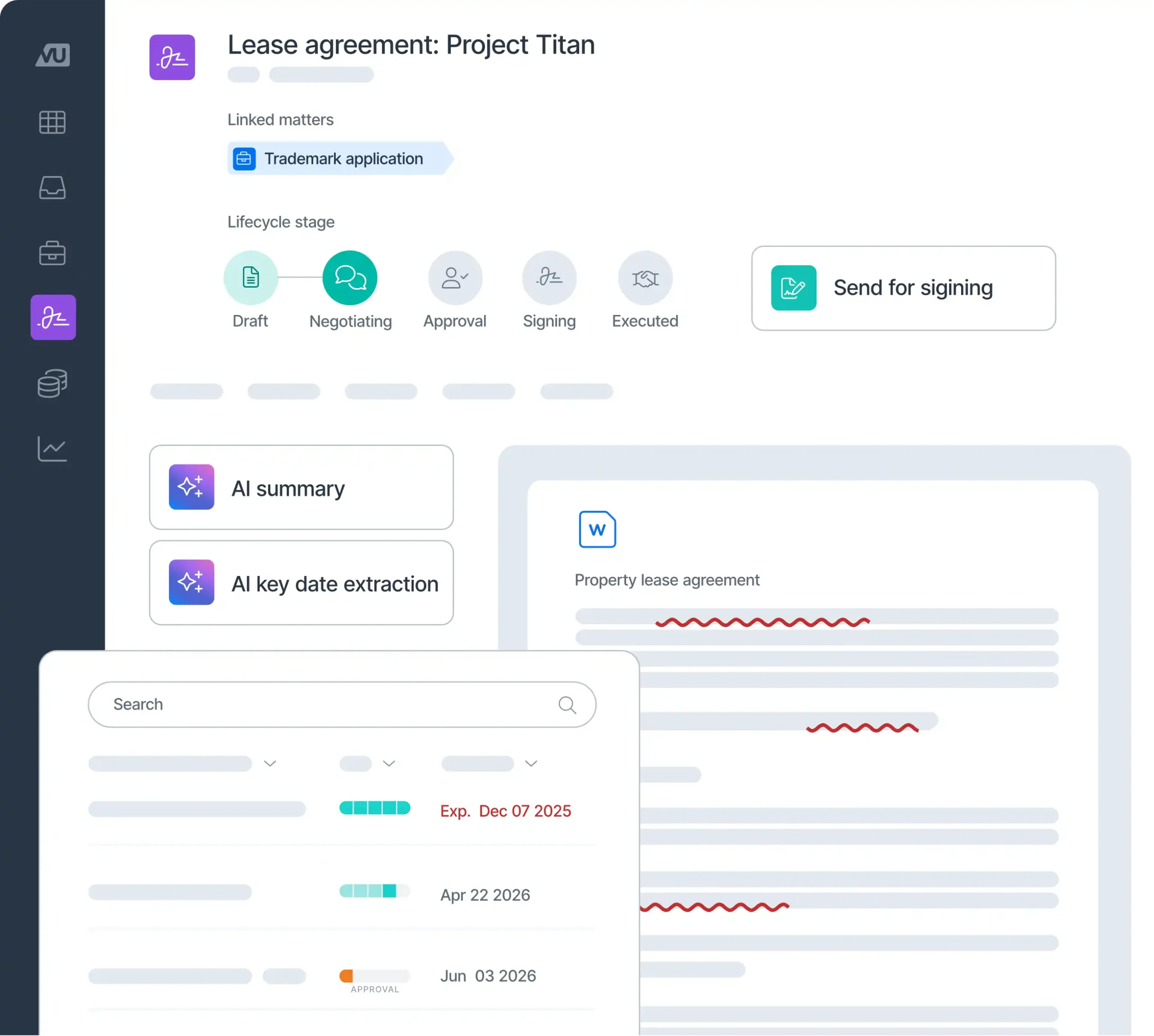An overview of AI, how it can benefit in-house legal processes, common pitfalls, and how AI works in a legal workspace.
Lawyers have long been perceived as hesitant toward change and wary of innovation. However, in the age of rapid technological advancement, it may be in in-house legal teams’ best interest to leave these stereotypes in the dust.
As identified in the 2023 In-house Legal Technology Report, finding efficiency and productivity gains is top of mind for many in-house legal teams and their businesses. Properly investing in and utilizing new technologies, such as Artificial Intelligence (AI) has the potential to revolutionize in-house legal operations. By utilizing AI, in-house legal teams can streamline repetitive tasks, improve accuracy, and spend more time playing an influential role in business outcomes.
Read on for an overview of AI, a detailed description of how it can benefit in-house legal processes, key considerations for buying legal technology with AI including the common pitfalls to watch out for, and to discover how AI works in a legal workspace.

AI is a broad term used to describe technologies that enable machines to perform tasks that would normally require human intelligence. AI has been in development since the 1950s, but has very recently started to gain worldwide attention. You may have even heard the terms generative AI, extractive AI and agentic AI. The field of AI includes a wide range of technologies and applications, from virtual assistants like Siri and Alexa to generative AI services like ChatGPT. Even if you don’t realize it, you already use AI in your daily life, with predictive text, suggested responses in email, and workflow tools.
There is a lot of speculation around AI and in-house legal functions these days, with some dismissing the power and others concerned that robots will actually replace lawyers altogether. Regardless of your own beliefs, AI is already finding its way into legal departments and is taking the world by storm. Rather than condemning it, in-house lawyers should look for opportunities to bring AI into their everyday work to optimize efficiency and workflows.
Legal teams are constantly being asked to do more with less, and this is amplified in the face of economic downturn. In-house legal professionals can use new AI tools to help with the routine aspects of their workday, such as contract negotiation and management. In addition to saving resource and budget, AI grants time back for in-house legal teams to make the most of their skills and reduce the time they are currently wasting on repetitive and low-value administrative tasks.
AI can also help legal departments get better use out of their data. Data regarding workflow, capacity, and resource can help legal leaders get stakeholder buy-in for budget or external counsel. Using AI to collate data such as the complexity of matters that a legal department has worked through or how many risky clauses have been successfully escalated and de-risked helps legal teams get accurate data and make better decisions.
Ultimately, as technology advances and companies develop better ways to harness the power of AI, these tools will further enable legal departments to streamline their workflows and deliver excellent legal services quicker. Whether AI can be used to replace the advice and decision making of the legally trained is another question, but the manual administrative components of the in-house legal workflow are certainly ready to be AI optimized.
AI relies on accurate and rich data sets. By having one connected system for matter management and contract lifecycle management, such as a legal workspace, legal teams can easily leverage AI models that will cater to all of their legal work, rather than having disparate models in different systems. For example, teams that manage all their workflows in the same platform could conceivably use an AI model to leverage advice in an IP dispute to draft better contract clauses to protect against that going forward.
While connected workflow platforms provide great efficiency and productivity gains on their own, their power and time savings are amplified when partnered with AI.
Law firms have been using AI for years to help make the document management and review process more cost-effective. Until recently, low-value, e-discovery work has been a huge cost center for in-house legal teams and a huge money maker for law firms. In-house legal teams are able to litigate far more efficiently, cut costs, and bring more work in-house by utilizing document review AI features.
In-house legal teams can leverage generative AI to improve contract review and contract management for reasons such as due diligence, reduced risk, and quicker turnaround times. New contract AI features mean that legal teams can quickly review material contracts and prepare reports for their portfolio, making it easy to accurately predict sales and revenue. In-house lawyers can also use contract analysis tools that utilize AI to review contracts more efficiently and present key findings from that review to stakeholders, saving both sides weeks or even months of wasted time trying to close a fundamentally flawed deal.
Legal automation presents an opportunity to remove the manual, repetitive tasks that are often taking up most of an in-house lawyer’s day. Using platforms with intake and triage capabilities can automate and streamline requests from the broader business, improving legal’s service delivery and allowing the business to self-serve. Beyond intake, automation can also tackle document execution, contract generation, and information requests. Automation fundamentally changes how in-house lawyers organize and manage their workload.
Like all good things, there are some things to watch out for when it comes to using AI-powered legal technology responsibly. AI-powered products have to be trustworthy, secure, and easy to use and understand. This is especially true when using AI in a legal setting, where the inherent risks of AI or badly implemented AI can expose you to risk or end up wasting more time. Some limitations and risks when it comes to using AI include:
In order to see value from legal tech and AI, the features actually need to solve your problems. Therefore it’s important to do your research and find a solution that meets your team’s specific needs. Here are a few things you should consider:
Just like any other product feature, AI should be used alongside a functional product that helps you create value. With the LawVu legal workspace, in-house legal teams can see value with contracts and matters managed together for ultimate visibility and take advantage of contract review, extraction, and other AI features that speed up turnaround times and allow legal teams to focus on more impactful work.
A legal workspace is a single source of truth for in-house legal workflow management. It offers one holistic view of the entire legal function’s workflow, including matters, contracts, documents and knowledge base, outsourced work, spend, and data and reporting. With 61% of in-house legal teams spending over one hour per day jumping between systems to gain a complete view of their work (Source: The 2023 In-house Legal Technology Report), a legal workspace offers a unique solution by providing a one-stop shop for workflow management.
The productivity and efficiency gains of a legal workspace are further amplified by harnessing the power of AI, automating manual admin tasks, and freeing time up for in-house lawyers to focus on more important tasks. Below are some ways AI is utilized in the LawVu legal workspace.
Reduce time spent importing contracts to your legal workspace with AI-powered contract import and review.
This new integration with Zuva’s DocAI imports bulk legacy contracts four times faster than before, reducing the effort of manually collecting and extracting metadata so you can see contract value quicker than ever before.


Experience a faster path to your important data with AI-powered contract data extraction, an integration with Zuva’s DocAI that automatically analyzes and extracts key contract data whenever a contract is executed.
Help your team free up time to focus on verifying what the AI has found, rather than wasting time scrolling, copying, and retyping from the contract.
Take advantage of your new contracts buddy!
Optimize your contract repository with a beta conversational tool that reviews and summarizes key contract information. Use quick prompts to find out about parties involved, key dates, scope, work/services, payment terms, liabilities, and warranties, fast, so you can reduce the risk of misunderstanding and align all stakeholders.

